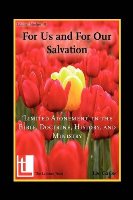For Us and For Our Salvation: ‘Limited Atonement’ in the Bible, Doctrine, History, and Ministry by Lee Gatiss is quite simply one of the most cogent brief treatments of the subject of the extent of the atonement that you will find. It is marked by simplicity and clarity, and it is remarkably well-informed theologically, exegetically, historically, and pastorally. Yes, it is still true that you have not finished your study on this subject until you have read John Owen. And you won’t want to miss Jonathan and David Gibson’s comprehensive tome on the subject (for which see our interview here and here). And there are others you will want to read also. But you will be hard pressed to find a more helpful introduction to or finer summary treatment of the study than Gatiss gives us in the brief space of just 129 pages. We’re happy to have the author (Director of Church Society and Lecturer in Church History at Wales Evangelical School of Theology) here to talk to us today about his book and his subject.
Books At a Glance (Fred Zaspel):
Stating and understanding the question rightly is always the most important first step in discussions such as these. And in this discussion in particular, as you mention, considerable confusion has arisen from a misunderstanding of the point at issue. So then, what, precisely, is the point at issue in this question?
Gatiss:
The question in essence is, “What did God intend when he sent Christ into the world?” It is about the design of the work of Christ, particularly about the relationship between predestination and the atonement – the eternal plan of salvation and its temporal accomplishment. The question isn’t whether God loves everyone. It isn’t whether what Jesus did is sufficient for all in some way or offered to all, or even whether his death benefits the non-elect somehow. Those things are taught explicitly by many Reformed theologians. It is more focused on the intention, purpose, and will of God in sending Jesus to die.
 Books At a Glance:
Books At a Glance:
In what sense is it so, as you point out in your book, that all sides believe in an atonement that is “limited” in some way?
Gatiss:
Some people don’t limit the atonement, of course: those who think that everybody is saved in the end. But both Arminians and Reformed theologians impose a limitation of some kind on what Jesus did. The Reformed limit, or focus, the work of the cross by reference to the plan of God: it actually saves a group of people defined by God. Those on the other side say that it was designed to save everyone, but conditionally, if they believe. That is, we decide, not God. A well-known Arminian scholar (Ben Witherington) wrote a few years ago that, “The Reformation inclination to say the atonement is limited was correct, but… it must be human beings in their response to God in Christ, not God through some process of choosing individuals, who limit the atonement.”
Books At a Glance:
Opponents of particular redemption have often charged that it is a doctrine grounded in mere logic. Of course the Calvinist responds that their position is eminently logical because (we believe) it is scriptural. And in any case, at the end of the day all sides will want to claim that their position is both logical and well-grounded exegetically. But can the Calvinist press the question in return? What logical problem(s) might the Arminian face on this score? And how should we best understand the role of logic in such issues?
Gatiss:
Logic has its place as a biblical tool for discovering truth, whether in nature or in scripture. A recent philosophical paper (which I cite in my book) argued that the existence of logic is actually a powerful argument for the existence of God! The logical connective “therefore” is used about 800 times in the Bible. Jesus used logic of various types, and in the Gospels he holds people accountable to use logic well. The way different Bible authors compare scripture with scripture and draw conclusions demonstrates the godly usefulness of logic. So we have to use rational deductions and can’t just dismiss those out of hand as “going beyond scripture.” The right use of logic is scripturally authorised and mandated.
That being said, of course, we must always be careful not to squeeze God into a pre-existing, philosophically determined framework of our own making. Because of the Fall, our logic may be flawed, and needs always to be tested by scripture. Our understanding of scripture also needs to be tested, and we should be open to the possibility that we have misread it. It is safe to say, with the Anglican Thirty-nine Articles, however that we may not “so expound one place of Scripture, that it be repugnant to another” (Article 20). If we think the Spirit of the Scriptures contradicts himself somewhere, the problem is with us, not him!
One logical way to approach the atonement question is to ask, was Christ punished for …
a) all the sins of all people, or
b) some sins of all people, or
c) all the sins of some people?
If the first, then all are saved! If Christ died for all the sins of all people, surely that includes the sin of unbelief. God punishing the same sins twice would seem to be unjust, and therefore no-one will be punished in hell even for not believing in Jesus. Most of us don’t see that as a scripturally credible option.
If the second option is correct, then we all still have some sins to answer for, and so are not
saved by the cross at all. It only makes us saveable perhaps, or goes part of the way to helping us. That isn’t how the work of Christ is presented in the Bible.
This leaves only the third option, which is that Christ was punished for all the sins of the elect, who are truly and effectively saved by it.
To say that scripture never presents the question in exactly those terms is true, but it is also just an evasion: scripture doesn’t explicitly address lots of questions which we still need to ask and answer (such as, “Do dying babies go to heaven?” or “Is God a Trinity?” or “Is Christ physically present in the bread and wine of the Lord’s Supper?”)
Books At a Glance:
How do Arminianism and Amyraldian differ on the question of the extent of the atonement?
Gatiss:
There are, of course, varieties of Arminianism, and varieties of Amyraldianism. But in general terms, the Arminian view is that Christ died for each and every person and paid the price for their all their sins. Whether they are actually saved, is ultimately down to them exercising their free will to believer or not.
The Amyraldian, or “hypothetical universalist” view, on the other hand, is a variety of Reformed theology. The Calvinist awkward cousin perhaps. It is happy to assert a focused, limited intention in the work of Christ. The cross infallibly achieved what predestination planned. But it goes on to add a hypothetical or conditional intention as well, i.e. Christ also died for everyone, if they have faith. He definitely saves the elect, and makes everyone else savable if they want to be. This “dual intention” idea seems to me to be a textless doctrine, but it is neat and tidy, and people often like to find a balanced middle position, which this purports to be, so I can see the attraction of it.
 Books At a Glance:
Books At a Glance:
Okay, how then do people differ in their interpretations of alleged “universal atonement” passages, such as 1 John 2:2?
Gatiss:
Once we get down to the nitty-gritty of interpreting passages of scripture, there are a great variety of approaches. Even …
Note: We will continue our interview with Dr. Gatiss here tomorrow.
Buy the books

FOR US AND FOR OUR SALVATION: 'LIMITED ATONEMENT' IN THE BIBLE, DOCTRINE, HISTORY, AND MINISTRY
